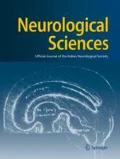Abstract
Langerhans cell histiocytosis (LCH) is a rare disorder in adults which usually manifests with involvement of multiple organ systems, including the central nervous system. We describe an unusual case of biopsy-proven LCH presenting with frontotemporal-dominant cognitive impairment with hypothalamic involvement, along with multisystem disease. We propose that the dementia was probably an immune-mediated process triggered by LCH which responded dramatically to high-dose steroids.


References
Emile JF, Abla O, Fraitag S et al (2016) Histiocyte Society. Revised classification of histiocytoses and neoplasms of the macrophage-dendritic cell lineages. Blood 127(22):2672–2681
Allen CE, Li L, Peters TL et al (2010) Cell-specific gene expression in Langerhans cell histiocytosis lesions reveals a distinct profile compared to epidermal Langerhans cells. J Immunol Baltim Md 1950 184(8):4557–4567
Baumgartner I, von Hochstetter A, Baumert B, Luetolf U, Follath F (1997) Langerhans’-cell histiocytosis in adults. Med Pediatr Oncol 28(1):9–14
Grana N (2014 Oct 1) Langerhans cell histiocytosis. Cancer Control 21(4):328–334
Grois N, Pötschger U, Prosch H, Minkov M, Arico M, Braier J, Henter JI, Janka-Schaub G, Ladisch S, Ritter J, Steiner M, Unger E, Gadner H, for the DALHX- and LCH I and II Study Committee (2006) Risk factors for diabetes insipidus in langerhans cell histiocytosis. Pediatr Blood Cancer 46(2):228–233
Gallo MSG, Martínez MP, Abalovich MS et al (2010) Endocrine manifestations of Langerhans cell histiocytosis diagnosed in adults. Pituitary 13(4):298–303
Grois N, Prayer D, Prosch H, CNS LCH Co-operative Group et al (2005) Neuropathology of CNS disease in Langerhans cell histiocytosis. Brain 128:829–838
Allen CE, Flores R, Rauch R, Dauser R, Murray JC, Puccetti D, Hsu DA, Sondel P, Hetherington M, Goldman S, McClain KL (2010) Neurodegenerative central nervous system Langerhans cell histiocytosis and coincident hydrocephalus: treated with vincristine/cytosine Arabinoside. Pediatr Blood Cancer 54(3):416–423
Tamai S, Ueno M, Hayashi Y et al (2018) Enlargement of Langerhans cell histiocytosis of the hypothalamus with progression into the basal ganglia and white matter. Surg Neurol Int 9:197
Yeh EA, Greenberg J, Abla O et al (2018) Evaluation and treatment of Langerhans cell histiocytosis patients with central nervous system abnormalities: current views and new vistas. Pediatr Blood Cancer 65(1). https://doi.org/10.1002/pbc.26784
Author information
Authors and Affiliations
Corresponding author
Ethics declarations
Conflict of interest
The authors declare that they have no conflict of interest.
Additional information
Publisher’s note
Springer Nature remains neutral with regard to jurisdictional claims in published maps and institutional affiliations.
Rights and permissions
About this article
Cite this article
Garg, D., Pedapati, R., Nakra, T. et al. Langerhans cell histiocytosis presenting as a rapidly evolving frontotemporal syndrome. Neurol Sci 40, 1055–1058 (2019). https://doi.org/10.1007/s10072-019-3709-y
Received:
Accepted:
Published:
Issue Date:
DOI: https://doi.org/10.1007/s10072-019-3709-y

